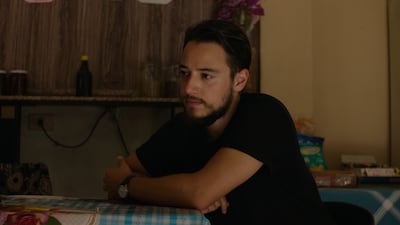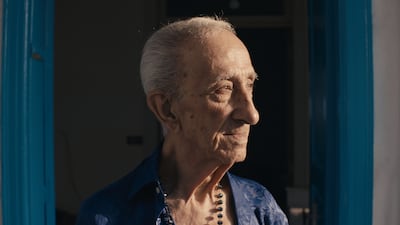After a two-year hiatus, filmmaker Karim Kassem has finally resumed work on his feature film Thiiird. The movie will tell the story of a mechanic who, while repairing cars for customers, realises they need fixing themselves.
“The garage turns sort of into a therapy space, where people want to just come and talk. And the mechanic will have to listen, even though he is going through his own inner turmoil," Kassem explains. "In a way, that is the Lebanese situation overall.”
These notions of rebuilding and repair have become somewhat characteristic of Kassem's work. In 2020, he began to rethink the premise of the film, which he'd originally called Octopus, as he was forced to make way for another, more immediate project. One that began with a great thundering boom, and was conceived in silence.

In August that year, Kassem had just arrived in Beirut and was spending time in quarantine in a seaside hotel when one of the largest and most catastrophic non-nuclear blasts in history occurred in the port.
“My mother had come to visit me in the room,” he says. “We sat on the balcony six feet apart and that’s where we witnessed this large mushroom cloud. Covid was over at that moment. We ran inside and were blown out of the room.”
He had returned from New York with the intention of preparing for his second feature film. After the blast, however, he decided to temporarily shelve that project and turn his attention to a documentary focusing on the consequences of the explosion. The only thing that remained from the original project was its title: Octopus.
The title lends the film a sense of symbolism. However, Kassem is hesitant about disclosing his take on what it means, saying: “It goes against what the film is about.” But he also says he won’t leave it too ambiguous because “that’s annoying".
“You might have a certain idea of what an octopus is and how that might relate to a city in this kind of situation,” he says. “One interpretation could be an ode to the sea, because if it wasn't for the sea, we would all be dead in Beirut. Sixty per cent of the explosion went towards the sea and Cyprus heard it.”
Another layer of symbolism comes from two people in the film diving into the water wearing snorkelling gear and surveying the seabed for an octopus, but finding only rubbish.
"We're really disrespecting the sea and the ocean environment, which is a total catastrophe," says Kassem. "Another way of looking at it is, how politically we are being kind of moved around with these tentacles under one large mind that is operating and controlling how Beirut moves around."
The blast killed more than 200 people and injured 7,000. It also left 300,000 people homeless as it devastated residential and commercial districts in the Lebanese capital, which was already in the throes of an economic crisis.
Octopus had its premiere at the 2021 International Documentary Film Festival Amsterdam, where it won the Best Film award in the Envision Competition. Last month, it also made its regional debut at the Red Sea International Film Festival.
Silence permeates the film. Yet, despite barely containing an uttered word, Octopus is deafening.

The film forgoes interviews that dive into the lives of its subjects. Instead, the thousand-yard stares and sorrowful clean-up process after the blast articulates much more. The elderly sweep broken glass from their homes and try to repair their most prized belongings. Nuns mourn their fallen peers and construction workers clear the debris from streets and buildings.
For a shared experience as traumatic and ineffable as the port explosion, silence is the most expressive form of expression.
"I knew immediately after the explosion that I would make a silent film,” Kassem says. “How big the explosion was said it all. I chose silence because I could say everything without saying anything. It's a different form of expressing yourself. Silence really plays a huge role in this kind of film. Because of the event.
"Obviously, it doesn't work with every kind of film, but you can make silent films in very creative ways. It's very difficult to make a feature that is silent in today's era, but it's definitely possible.”
Kassem began filming Octopus a month after the blast. The Lebanese filmmaker says that, more often than not, people were open about discussing their experiences and what they endured in the wake of the catastrophe.

“We are psychological entities, we have feelings, we have emotions even when in shock,” he says. “After the explosion, I would go into people's houses. Whether they had doors or not, I would respectfully knock and try to enter. They would just talk and talk and talk for hours. I chose not to record those moments, because I knew I would be making a silent film. I chose to roll the camera right after they would stop talking, and that’s what you see in the film.”
For a film that does away with conventional structure or narration, Kassem relied on the camera to ensure its cohesion, carefully plotting its movements and overall trajectory.
“There’s a very particular design in the film structurally and where the camera is,” he says. “You move up from the ground floor, then you’re on a balcony and then a rooftop, and from the rooftop, you’re looking at the sea and then we cut to the sea. It was always meticulously planned, the way we’re moving the camera and hovering around. You can’t make a silent feature film and hope for the best, it has to be well thought through.”
Scroll through images of films to look forward to this year below



















